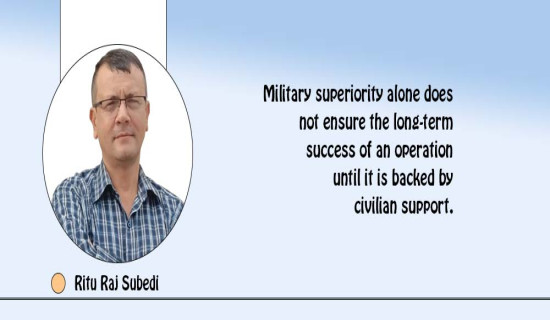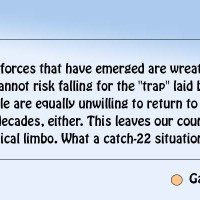- Tuesday, 13 January 2026
Post-legislative Scrutiny Key To Lawmaking
Nepal has elected a new parliament in the national elections held last month. The new government headed by CPN-Maoist Centre leader Pushpa Kamal Dahal Prachanda has been sworn in the other day with the support of seven political parties of which CPN-UML wields the linchpin position. Interestingly, newly emerged Rastriya Swatantra Party (RSP) with its 20 seats that vows to uphold alternative brand of politics has expressed its interest to ally with the coalition government headed by Prachanda. The new coalition setup led by Prachanda replaces the five-party alliance headed by Sher Bahadur Deuba which fought the last polls on behalf of the pre-election coalition alliance in which CPN-Maoist Centre was one of the key constituents.
Needless to repeat, the country has adopted federal democratic polity pursuant to the provisions of the Constitution of Nepal, 2015. In this political dispensation, where separation of power has been the authoritative norm, lawmaking prerogative resides in the legislature while implementation of the laws enacted by the parliament is carried out by the executive organ of the government. Parliament enacts laws as the sovereign representative institution of the people. But if legislative body is not mindful and awakened enough to keep vigil over the application of laws, many of the legislations formulated by the parliament may not be implemented by the executive organ of the government.
Loss of legitimacy
In Nepal’s case, lawmaking process is beset with several deficiencies and shortcomings which, among others, includes the shelving of the legislative bills in the House for long without due discussion and deliberation leading to their losing of relevance and legitimacy. More than dozen bills have gone invalidated and become irrelevant in the last parliament as the House had failed to discuss and ensure their passage and endorsement in due time. Another deep seated malaise has been that the most of laws and legislations passed by the federal and provincial parliaments have gone unimplemented thus failing to fulfill the purposes they were enacted for. This shows the ineffectiveness of the parliaments both in the federal and provincial levels elected according to the provisions of federal constitution.
Needless to say, parliaments devote a large part of their human and financial resources to the process of lawmaking. However, implementation of law thus enacted by the parliament is oftentimes overlooked and not given needed attention. Law application and enforcement is indeed a complex matter. It depends on the mobilisation, utilisation of ideas, expertise, resources and collaborative role of different actors as well as their commitment to the spirit and values enshrined in the legislations. Similarly, it also demands full-fledged coordination and cooperation among all actors and stakeholders involved.
It needs to be recognised that implementation does not happen automatically immediately after the enactment of laws. Several aspects can affect the course of application. The factors affecting the application of laws include changes in facts on the ground, diversion of resources, deflection of goals, resistance from stakeholders and implementing actors and so on. Furthermore, implementation of legislation and policies may also be undermined by power asymmetries, exclusion, and state capture by vested interests and well entrenched clientelism.
ADespite these hindering factors, according to a resource book produced by UK based Westminster Foundation for democracy (WFD), some overarching reasons give rise to imperatives as to why parliaments should take upon the responsibility to monitor and scrutinise the implementation of legislation and hold the government to account if implementation is not accorded due attention and priority to this end. Parliaments should assess the implementation of laws to ensure the requirements of democratic governance and legal certainty, ascertain barriers that adversely affect their application. This process is called post-legislative scrutiny (PLS) which is needed to support a consolidated system of appraisal for assessing how effective a law is at regulating and responding to problems, issues and events. Moreover, the scrutiny is also necessary to effect and support improvements in legislative quality by learning from experience both in terms of what works and what does not.
PLS, according to WFD resource book, is also required to look at whether the legal provisions of the law have been brought into force, how courts have interpreted the law and how legal practitioners and citizens have used the law.
PLS thus looks at the impact of legislation; whether the intended policy objectives of the law have been met with special focus on effectiveness. When analysing the impact of legislation, one needs to consider the cumulative effect of legislation, as well as how the state of affairs within a policy area has been shaped by different pieces of legislation. Legislative impact is rarely the effect of one single piece of legislation. Hence it is useful to consider the cumulative effects of the legislative products concerned.
Delegated legislation
Acts of parliament often grant ministries of the government powers to make delegated or secondary legislation. It is very much important to review secondary or delegated legislation at the same time as reviewing the parent legislation from which it owes its authority. This is particularly the case in Nepal where delegation legislations formulated by the ministries hold most of the provisions to give effect to primary legislation. Parliamentary committees in Nepal should therefore take upon the task of scrutinising the effects of specific secondary legislation especially to look at their crosscutting impacts. Particularly interesting topics to look upon during the post-legislative scrutiny could be gender or human rights, regulatory or environmental burdens. As newly elected parliament is going to resume its business soon in Nepal, it is imperative that the parliament give serious thought to undertake post-legislative scrutiny to ensure that the lawmaking function it undertakes become useful and produces intended results and outcomes. In this regard, assistance from research organisations and think tank bodies can become instrumental and helpful.
(The author is presently associated with Policy Research Institute (PRI) as a senior research fellow. rijalmukti@gmail.com)










-(1)-original-thumb.jpg)






